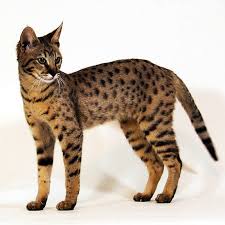
Kanaani
Conditions of detention
Kanaani cats are active and require an environment that provides plenty of space to explore and play. They benefit from having access to climbing structures, interactive toys, and activities that engage their intelligence and natural agility.
Useful Fact:
Kanaani cats are known for their energetic and playful nature. They thrive in households where they receive ample attention and can participate in interactive play with their human companions.
Nutrition and diet
Kanaani cats require a balanced diet consisting of high-quality cat food rich in proteins, fats, vitamins, and minerals to support their active lifestyle and muscular build. Fresh water should always be available, and portion control is essential to prevent obesity.
Useful Fact: Kanaani cats, due to their high energy levels, may benefit from a diet formulated for active or athletic cats, which provides extra nutrients to support their activity.
Health
Kanaani cats are generally healthy, but regular veterinary check-ups, vaccinations, and preventative care are crucial. They should be monitored for common feline health issues such as dental disease and obesity.
Useful Fact: Due to their hybrid ancestry, Kanaani cats may have a stronger immune system compared to some purely domestic breeds, but it’s still important to monitor their health closely.
Grooming and care
Kanaani cats have low grooming needs due to their short, sleek coat. Weekly brushing helps remove loose hair and keep their coat healthy. Regular nail trimming, ear cleaning, and dental care should also be part of their grooming routine.
Useful Fact: Kanaani cats enjoy grooming sessions, which can be a good opportunity for bonding and ensuring they remain comfortable and well-maintained.
Education and training
Kanaani cats are highly intelligent and can be trained using positive reinforcement techniques. They can learn tricks, use a litter box efficiently, and follow basic commands with consistency and patience.
Useful Fact: Kanaani cats often excel at interactive training sessions and can be taught to perform a variety of tricks and tasks, enjoying the mental stimulation and bonding time.
Toys and entertainment
Interactive toys, puzzle feeders, and climbing structures are essential for keeping Kanaani cats entertained. Providing a variety of toys helps to stimulate their active minds and prevent boredom.
Useful Fact: Kanaani cats have a strong prey drive, so toys that mimic the movements of prey, such as feather wands and laser pointers, are particularly appealing to them.
Safety
Indoor living is recommended for Kanaani cats to protect them from outdoor hazards such as traffic, predators, and diseases. Ensure windows and balconies are secure to prevent accidents.
Useful Fact: Due to their adventurous nature, providing a safe and stimulating indoor environment with plenty of opportunities for exploration is essential for Kanaani cats.
Accessories
Essential accessories for a Kanaani include a sturdy scratching post, comfortable bedding, litter boxes, and grooming tools. Interactive toys and climbing trees are also beneficial for their physical and mental stimulation.
Useful Fact: Providing vertical spaces like cat trees or shelves can help satisfy the Kanaani cat’s natural climbing instincts and provide them with a sense of security.
Socialization
Kanaani cats are naturally sociable and thrive on interaction with their human families and other pets. Early socialization helps them develop into well-adjusted adults who are comfortable in various environments.
Useful Fact: Kanaani cats often form strong bonds with their owners and enjoy being involved in family activities, making them excellent companions for active households.
Travel and Transportation
Kanaani cats can adapt to travel if introduced gradually. Using a secure carrier and providing familiar items like a blanket or toy can help reduce travel-related stress.
Useful Fact: Some Kanaani cats may enjoy exploring new environments and can be trained to walk on a leash, making them good travel companions for adventurous owners.
Behavior and psychology
Kanaani cats are affectionate, playful, and inquisitive. They are known for their loyalty and strong bonds with their owners, often displaying dog-like behavior in their interactions.
Useful Fact: Kanaani cats can be quite vocal and expressive, using a variety of sounds to communicate their needs and feelings to their owners.
Legal aspects
Before acquiring a Kanaani, check local regulations regarding pet ownership, including licensing and microchipping requirements. Adherence to responsible breeding practices and animal welfare laws is also important.
Useful Fact: Kanaani cats are recognized by some cat registries, ensuring adherence to breed standards and promoting responsible breeding practices.


